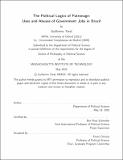The political logics of patronage : uses and abuses of government jobs in Brazil
Author(s)
Toral, Guillermo,Ph. D.Massachusetts Institute of Technology.
Download1221003635-MIT.pdf (4.117Mb)
Other Contributors
Massachusetts Institute of Technology. Department of Political Science.
Advisor
Ben Ross Schneider.
Terms of use
Metadata
Show full item recordAbstract
The political appointment of bureaucrats (or patronage, for short) is a major resource for politicians all around the world. While scholars have long studied patronage, we lack a detailed understanding of how politicians target public employment and how that affects governance and public service delivery. This dissertation contributes to fill this gap. I identify five distinct rationales that drive politicians' use of government jobs: managing bureaucrats (to deliver public services or to extract rents), mobilizing voters, rewarding supporters, tying the opponent's hands, and anchoring coalitions. Each of these political logics of patronage has a different rationale, distinct employment patterns, and divergent effects on governance and service delivery. Empirically, I document the logics of patronage with data on Brazilian municipal governments, a particularly useful context to study patronage given its wide variation in political and economic development and the coexistence of patronage with civil service and other bureaucrat selection modes. To illustrate the diverse uses of patronage and their consequences I combine administrative microdata (including restricted-access, identified data on the universe of municipal employees, and data on the performance of education and healthcare bureaucracies), two original surveys in one state (a face-to-face representative survey of 926 bureaucrats, and an online survey of 755 local politicians), and 121 in-depth interviews with bureaucrats, politicians, and anti-corruption agents done over 18 months of fieldwork in 7 states. Three novel implications emerge from this dissertation. First, patronage can alleviate agency problems and thus enhance the accountability and effectiveness of bureaucrats, not only to extract rents but also to deliver public services. Second, when politicians use patronage to extract rents, they mobilize a diverse set of strategies that go beyond the hiring of supporters, including the hiring of civil service bureaucrats and the firing (not just hiring) of temporaries. Third, policies commonly used to reduce patronage -- such as civil service regimes, legal constraints on hiring, and elections for key bureaucratic positions -- can have undesirable consequences because of politicians' strategic responses to constraints on their hiring discretion. These findings are relevant to scholars and policymakers seeking to understand and to improve governance and state capacity.
Description
Thesis: Ph. D., Massachusetts Institute of Technology, Department of Political Science, May, 2020 Cataloged from student-submitted PDF version of thesis. Includes bibliographical references (pages 309-330).
Date issued
2020Department
Massachusetts Institute of Technology. Department of Political SciencePublisher
Massachusetts Institute of Technology
Keywords
Political Science.